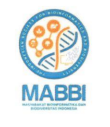Identification of Polyester Hydrolase (PETase) Enzyme-Producing Bacteria Based on 16S rRNA Gene Sequences from Bantar Gebang Landfill Soil
Abstract
The majority of PET plastic waste generated by human activities ends up in landfills without effective management, increasing the risk of environmental pollution and negatively impacting human health. This study focuses on exploring bacteria that produce Polyester Hydrolase (PETase), an enzyme capable of degrading plastic. The exploration was conducted by screening bacteria isolated from the Bantar Gebang landfill in Bekasi, West Java. The bacteria were characterized qualitatively using Gram staining and biochemical tests and quantitatively using selective Polycaprolactone media. Three isolates showed potential PETase enzyme activity: isolates P3, P4, and P6. Among these, isolates P3 and P4 displayed enzyme activity in selective media, as indicated by inhibition zones of 1.4 mm and 5.2 mm, respectively, and amplification of the PETase gene in molecular tests using 16S rRNA with a size of 1500 bp. Isolate P6 only showed amplification of a potential PETase gene in molecular tests. Sequence analysis identified the three isolates as Pseudomonas sp. with 97.76% similarity (Isolate P3), Pseudomonas fluorescens with 88.75% similarity (Isolate P4), and Bacillus subtilis with 93.31% similarity (Isolate P6). Among these, isolate P4 (Pseudomonas fluorescens) exhibited the greatest potential as a PETase enzyme producer.
Full Text:
PDFDOI: https://doi.org/10.47007/ijobb.v9i1.266
Refbacks
- There are currently no refbacks.
| Indonesian Journal of Biotechnology and Biodiversity Published by: Publishing Department of Esa Unggul University Arjuna Utara No 9 Street Kebon Jeruk Jakarta - 11510 Indonesia | |








.png)

